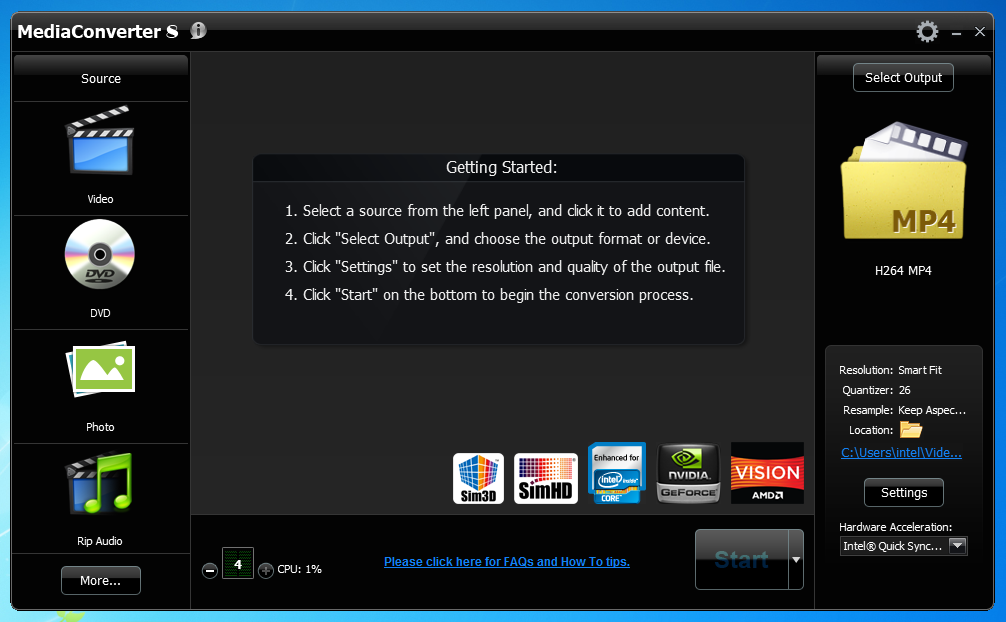

Using this processor: model name : Intel(R) Xeon(R) CPU E3-1578L v5 2.00GHz Useful info about my ffmpeg build: ffmpeg version N-93636-g6829c3c Copyright (c) 2000-2019 the FFmpeg developersīuilt with gcc 7 (Ubuntu 7.3.0-27ubuntu1~18.04)Ĭonfiguration: -prefix=/root/ffmpeg_build -pkg-config-flags=-static -extra-cflags=-I/root/ffmpeg_build/include -extra-ldflags=-L/root/ffmpeg_build/lib -extra-libs='-lpthread -lm' -bindir=/root/bin -enable-gpl -enable-libass -enable-libfdk-aac -enable-libfreetype -enable-libmp3lame -enable-libopus -enable-libvorbis -enable-libvpx -enable-libx264 -enable-libx265 -enable-libmfx -enable-nonfree I was expecting ffmpeg to encode my video using a hw accelerated h264 encoder via Intel QuickSync. Error initializing an MFX session: -3.įailed to set value 'qsv=hw' for option 'init_hw_device': Unknown error occurredĮrror parsing global options: Unknown error occurred

#Quicksync h.264 driver
Driver not found in known nonstandard list, using standard behaviour. VAAPI driver: Intel i965 driver for Intel(R) Skylake - 2.1.0. Initialised VAAPI connection: version 1.1 libva: Found init function _vaDriverInit_1_1 libva: Trying to open /usr/lib/x86_64-linux-gnu/dri/i965_drv_video.so Opened VA display via DRM device /dev/dri/renderD128. matched as output url.Īpplying option loglevel (set logging level) with argument debug.Īpplying option init_hw_device (initialise hardware device) with argument qsv=hw. matched as AVOption 'framerate' with argument '30'. matched as option 'b' (video bitrate (please use -b:v)) with argument '15M'. matched as option 'vf' (set video filters) with argument '-c:v'.

matched as input url with argument 'normal-desktop-use-1440p.mkv'. matched as option 's' (set frame size (WxH or abbreviation)) with argument '2560x1440'. matched as option 'pix_fmt' (set pixel format) with argument 'yuv420p'. matched as option 'f' (force format) with argument 'rawvideo'. matched as option 'filter_hw_device' (set hardware device used when filtering) with argument 'hw'. matched as option 'init_hw_device' (initialise hardware device) with argument 'qsv=hw'. matched as option 'loglevel' (set logging level) with argument 'debug'. I get the following error: Splitting the commandline. * Initial encoder implementation supports interop with GstD3D11 infrastructure, including zero-copy encoding with upstream D3D11 element.Ffmpeg -init_hw_device qsv=hw -filter_hw_device -f rawvideo -pix_fmt yuv420p -s:v 2560x1440 -i normal-desktop-use-1440p.mkv -c:v h264_qsv. We can add the optimization for Linux later once GstVA library exposes allocator/bufferpool implementation as an API like GstD3D11. Note that because of the design decision, VA/DMABuf support is not made as a part of this initial commit. Specifically, GstQsvAllocator object will help interop between GstMemory and mfxFrameAllocator memory abstraction layers. Instead of implementing QSV specific allocator/bufferpool, this plugin will make use of generic GStreamer memory allocator/bufferpool (e.g., GstD3D11Allocator and GstD3D11BufferPool). * Memory allocator interop between GStreamer and QSV is re-designed and decoupled.
#Quicksync h.264 code
So, there will be no more SDK version dependent #ifdef in the code and also there will be no more build-time MSDK/oneVPL SDK dependency. * This plugin includes QSV specific library loading helper, called dispatcher, with QSV SDK headers as a part of this plugin. This will make encoder control/negotiation flow much simpler and cleaner than that of MSDK plugin. * Encoder will expose formats which can be natively supported without internal conversion. This new plugin has some notable differences compared with existing MSDK plugin.
#Quicksync h.264 windows
This plugin supports both Windows and Linux but optimization for VA/DMABuf is not implemented yet. A new implementation of Intel Quick Sync Video plugin.


 0 kommentar(er)
0 kommentar(er)
